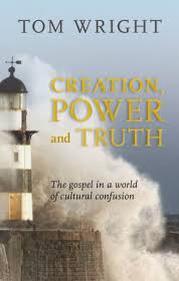
Reading about the American Civil War, Leonard Cohen and the corruption of civilisation in Hitler's Final Solution – a corruption that enabled 'ordinary men' to do inhuman things to other people – might not sound like happy holiday reading. But, it is good holiday reading and, given the space to think and not just move on to the next appointment, it brings into focus the themes addressed by Tom Wright in his newly-published 'Creation, Power and Truth'… which I have just read today.
Wright's thesis is that, if “postmodernity has been a necessary protest against modernist arrogance,… it has not provided us with an alternative worldview capable of sustaining a new way of being human in our late-modern Western world” (p.72). Earlier he suggests that “postmodernity seems within the providence of God to have the role of preaching the doctrine of the Fall to arrogant modernity” (p.68).
You have to read these lectures in order to get his essential drift, but he articulates something that haunts the other books I have been reading. Perhaps it is something like this: we have successfully removed concepts such as 'evil' from our worldview (apart from when we need to express horror at people-not-like-us such as paedophiles), then found ourselves unable to address the world as it is in anything like sustainable moral terms.
The Americans fought over many things in the Civil War, but two of them were (a) visions of how the individual relates to the state (and one state to another) and (b) whether some people are more human – or to be defined in terms other than economic value – than others (black slaves, for example). The myth of progress that was supposed to have lain bleeding in the trenches of Europe after the 'war to end all wars' survived, in the absence of any alternative narrative, and fed the technological and bureaucratic machine that created the extermination camps of the Nazis.
If postmodern reality is proving disappointing – particularly in not offering a moral vocabulary that carries any weight other than that of (what I might call) pragmatic convenience, then where might we look for a new narrative? Tom Wright invites us to look back in order to look forward – to the narrative of createdness (and all that this assumes), the freedom to “speak truth to power” (especially the power of the 'empire'), and the creative confidence to live in communities of active love that offer the world a different way.
Those who have already written off the Christian narrative – often by prejudice and/or without examining it – will not be convinced that Christianity has anything to say about anything, especially politics. Notwithstanding this, and the aggression with which this bizarre (and irrational) rejection is often articulated, Christians must develop the confidence in the good news of Jesus Christ which, as Pontius Pilate discovered in his personal encounter with him, is rooted in a fundamental affirmation of creation and the real world, a freedom and courage to question and confront the empire (the powers that be), and to inhabit the life-giving truth about human nature and the future of the world.
Otherwise, we must ask on what basis we bring to bear any moral judgement on the ubiquitous experiences of systematic cruelty, the dehumanising of 'the other', or the abuse of truth in the pursuit of power.
(And now I am moving on to Abraham Lincoln…)

